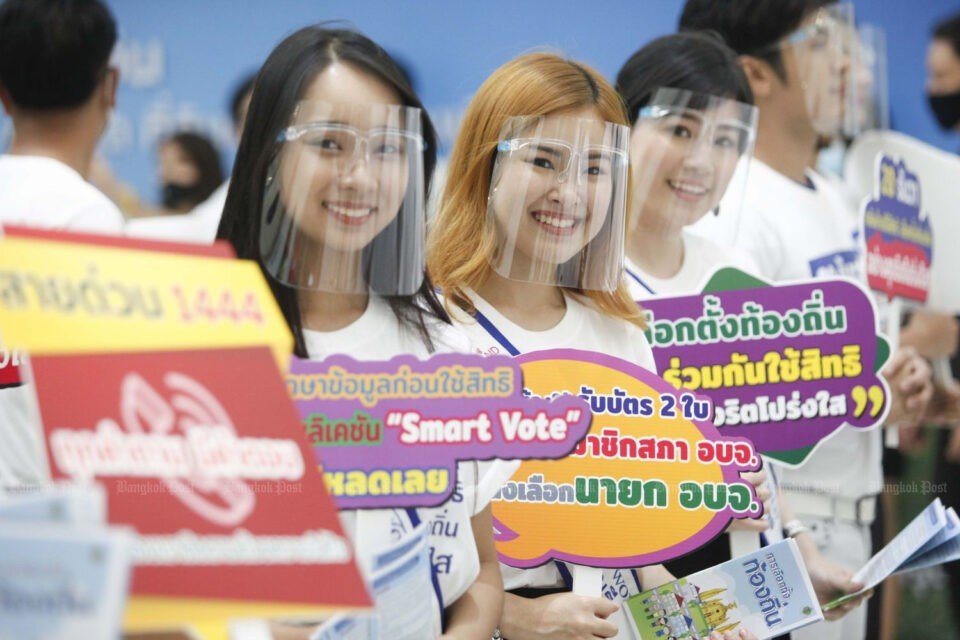Voters across the country, except in Bangkok and Pattaya, will get to elect local representatives on Sunday, the first glimmer of hope for decentralisation in six years.
Polls in 76 provinces will be held to choose chief executives of the provincial administrative organisations (PAOs) and members of PAO councils.
According to the Election Commission (EC), 335 people have applied to be PAO chief candidates and 8,186 are seeking council seats. Buri Ram saw the most candidates — eight for chief and 344 for the council. Phetchaburi has the fewest candidates — one and 33 respectively.
A PAO is responsible for public services such as roads, bridges, sewage systems and electricity. It also maintains order, promotes tourism, preserves natural resources and supports education and culture.
Its funds come mainly from the local taxes it is empowered to collect — from oil trade, tobacco and automobiles to fees from hotel guests. The central government also provide each province with additional funds, at 28.8 billion baht in total in the fiscal 2021 budget.
Provincial administrations will also be able to collect and use property tax revenue, but the long-awaited law has not yet come into effect.
Provincial governors are appointed by the Interior Ministry but administration in each province is overseen by the elected PAO chief. The council acts as the legislative arm to issue regulations and allocate budgets for projects.
A PAO chief can serve a maximum of two four-year terms, after which he or she must take a four-year break. The salary for the position is 75,540 baht a month.
PAO council members are elected with districts as constituencies. Their numbers vary in each province by population — 24 for a population up to 500,000, 30 for 500,000 to 1 million people, 36 for 1 million to 1.5 million, 42 for 1.5 million to 2 million, and 48 for 2 million people or more. They also serve a four-year term and are paid 19,440 baht a month each.
Each voter, aged 18 or over, will be given two ballots of different colours, one each for a PAO chief candidate and a PAO councillor candidate. The polls will be open from 8am to 5pm.
Voters need to bring a citizen ID card — an expired one can also be used — or any ID card with a photo issued by a government agency. They are also required to wear a face mask for protection against the coronavirus.
While the EC prohibits political parties from campaigning openly for candidates, several parties support people to run independently since
PAOs represent a good support base for general elections. Local voters generally have a clear idea which party is backing a candidate.
A candidate can be fielded by a political party, but parties, MPs and senators may not campaign on his behalf. The governing Palang Pracharath Party (PPRP), for example, did not field anyone under its banner but several candidates who are known to be PPRP supporters are running independently or under other groups.
In the current campaign, only the Progressive Movement, led by former MP Thanathorn Thanathorn Juangroongruangkit, has been actively campaigning for candidates since technically it is not a political party.
Even though voters have been waiting for more than six years, turnout is projected to be low because the election date is so close to year-end holidays. Voters who work elsewhere have few incentives to return home just to vote when they will have to go back home anyway during the long New Year break. The EC expects a 75% turnout. Previous turnouts were around 70% to 80%.
According to observers, there are three phenomena to monitor in this election.
First, since the military junta banned local elections six years ago, the number of first-time voters, aged 18-26, is very high and many of them have been politically active in recent months.
Second, the Pheu Thai party, which supports 25 PAO chief candidates, has been challenged in Chiang Mai, the hometown of its perceived leader Thaksin Shinawatra.
Pichai Lertpong-adisorn, the No.1 candidate for the northern province, is backed by Pheu Thai. Boonlert Buranupakorn, a two-time PAO chief, is running under an independent group as No.2, with the support of red-shirt leader Jatuporn Prompan.
Thaksin went live on Facebook this month urging Chiang Mai voters in a northern dialect to elect Mr Pichai.
The result in the province could be a gauge for the popularity of Thaksin and Pheu Thai in its perceived stronghold.
Third, observers are curious to see how the Progressive Movement, which arose from the ashes of the court-dissolved Future Forward Party, will be
able to make electoral history again with a strong showing by its preferred contenders.
The group is fielding 42 PAO chief candidates, most of whom are new faces, and leaders Thanathorn Juangroongruangkit and Piyabutr Saengkanokkul have been working hard on the campaign trail over the past several months. Future Forward, since renamed Move Forward, surprised everyone with its success in the 2014 general election where it won more than 80 of 500 MP seats.
As in the general election, the non-government organisation iLaw is asking as many people as possible to help it count votes by taking photos of the vote results shown in front of polling stations and uploading them to an online platform. The results will be compiled realtime and shown on the website vote62.com. The more people do this, the more accurate the results are, it claims.
In a related development, a group of people on Friday filed a petition with the Ombudsmen related to the Local Administration Act, which they claimed disenfranchises people who moved to another district less than one year before an election.
They claimed the clause was unconstitutional and asked the Ombudsmen to seek a Constitution ruling on the issue.
They argued that the MP election law had a similar clause but, unlike the local election law, it gives people recourse by allowing voters who migrated less than 90 days before an election to vote in their previous constituency, whereas the local election law does not.
bkk post




